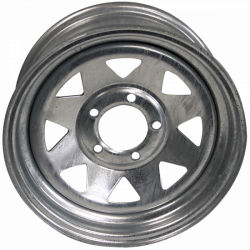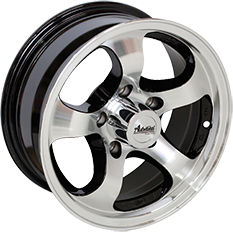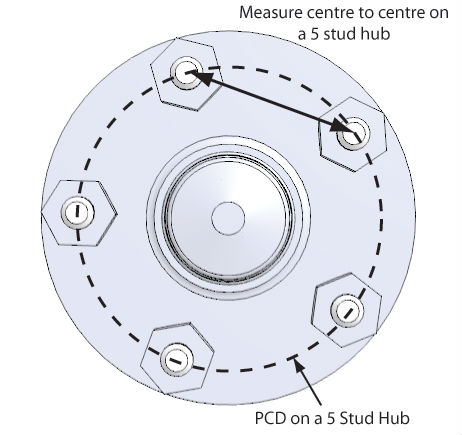TRAILER WHEELS
It has been common practice for the last 50 years or so, to use old or second hand car wheels for use on trailers. As these older wheels start to deteriorate or get damaged, it is getting harder to source replacement wheels with some styles/models impossible to find.
 It is now more commonplace to purchase specific trailer wheels to replace these and your local supplier will be able to recommend a replacement wheel. In some cases you will need to also replace your hubs to match stud patterns.
It is now more commonplace to purchase specific trailer wheels to replace these and your local supplier will be able to recommend a replacement wheel. In some cases you will need to also replace your hubs to match stud patterns.
4 stud wheels are still available in the smaller 12" diameter wheels with 5 stud wheels being the most common for trailers up to 5000 lb GTW (2250kg). 6 stud wheels should be the minimum size used on trailers over 5000 lb GTW (2250kg).
New wheels are available painted, chromed or fully hot dip galvanized and come in a range of diameters, widths and offsets (see below) and load capacities.
There is also the option of paying a bit extra and fitting alloy wheels especially designed for trailers, just remember to fit then with locking lug nuts to prevent them from being stolen.
Wheel Dimensions
Wheels are always measured in inches and there are four measurements you need to know before purchasing.
- Wheel Diameter
This is the diameter where the tire bead sits on the wheel and not the overall diameter. The tire sits on the first "step" inside the wheel and this is the measured diameter. Trailer wheels can come in all manner of diameters and standard sizes range from 8", 10.5", 12", 13", 14". 15" up to 16".
- Wheel Width
 Wheel width is measured across the wheel just inside the top lip, again where the tire will sit on each side. Tires are pretty flexible when it comes to fitting across wheels, but the wheel should be matched to the tire correctly to ensure tire stability and load carrying capacities are at their best.
Wheel width is measured across the wheel just inside the top lip, again where the tire will sit on each side. Tires are pretty flexible when it comes to fitting across wheels, but the wheel should be matched to the tire correctly to ensure tire stability and load carrying capacities are at their best.
Fitting a narrow wheel to a tire that is suited to a wider wheel can make the tire pop off the wheel if cornering under a heavy load. If you are fitting a nice wide wheel to a narrow tire, the tire sidewall will not have enough flex and the trailer will bounce excessively down the road. Talk to your tire specialist and match the wheels you want to the correct tire.
Trailer wheel widths vary between 3.75" up to 9". Alloy wheels are normally wider than steel wheels and can take a wider tire.
- Wheel Offset
Wheel offset is the measurement of the inside wheel face where the hub bolts onto the wheel, to the center of the wheel. A hub mounting face with a zero wheel offset is in the dead center of the wheel.
An offset of -0.50 means that the hub mounting face is 1/2" (12.5mm) back from the wheel center towards the trailer chassis. With a positive offset of +0.50 the hub mounting face is 1/2" (12.5mm) towards the outside of the wheel from center. If you haven't build your trailer yet, wheel offset should not matter too much and I would go for a zero offset wheel (unless you are after fancy alloys which may have different offsets). If you are replacing older rims, you will need to measure your existing wheels to find the offset and fit new wheels with the appropriate offset.
If you fit a zero offset wheels to a trailer where the old wheels have a +1.00 offset, you will have your tires and wheels sticking out wider from the trailer by 1" (25mm) each side, which apart from looking a bit ridiculous, may make the trailer illegal with not enough fender coverage over the tire.
The opposite will occur if you fit a +1.00 offset wheel on a trailer where it has been set up for zero offset wheels. The tire and wheel may rub against the trailer chassis and sides if there is not enough clearance. Ideally there should be at least 3/4" (20mm) clearance between your trailer and the tires to prevent any binding and to prevent mud buildup.
- Stud Pattern
 Many people have bought fancy new wheels for their trailer only to find that the stud pattern does not match their existing hubs, or they have bought wheels with a 5 hole stud pattern to fit 4 stud hubs. If you are replacing wheels, measure your existing stud pattern accurately and count the number of studs. Standard trailer wheels come in 4, 5 & 6 hole stud patterns.
Many people have bought fancy new wheels for their trailer only to find that the stud pattern does not match their existing hubs, or they have bought wheels with a 5 hole stud pattern to fit 4 stud hubs. If you are replacing wheels, measure your existing stud pattern accurately and count the number of studs. Standard trailer wheels come in 4, 5 & 6 hole stud patterns.
To measure the stub pattern you need to find the Pitch Circle Diameter (PCD) of your existing hubs.
The PCD is the diameter of the circle formed if it ran through the center of each stud.
On a 4 and 6 stud hub, this is as simple as measuring from the center of one stud to the center of the stud directly opposite.
On a 5 stud hub, a little bit of maths is needed. Measure from the center of one stud to the center of the adjacent stud next to it. Multiply this measurement by 1.701. This will give you the PCD in inches.
For example, if your measurement between stud centers is 2.64", multiply this by 1.701 and you get a PCD of 4.5".
Final points to consider
Check with your supplier that the wheels you want have the appropriate load capacity you require. Trailer wheels will have a load capacity rating stamped somewhere on the wheel. Double check before purchasing.
If you are buying new alloys for your existing hubs, you will want to check that the center spigot of the hub will fit through the wheels center hole. The last thing you want to do is have to machine out your nice new rims to fit your hubs. If your new alloys comes with a fitted cap, make sure that this will fit comfortably over your hubs dust caps.
Check that you have the correct studs and lug nuts for your wheels, check with your supplier and get the right ones fitted. Upgrading or replacing studs in your existing hubs is a relatively easy task and while the hubs are off, you can do a bit of hub maintenance.
Lastly, get your new tires and wheels balanced before fitting onto your trailer. If its good enough for your tow vehicles wheels to be balanced, its good enough for your trailer!